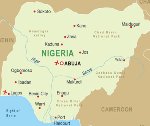LAGOS (Reuters) – Nigerian President Umaru Yar'Adua needs to name a new cabinet quickly if he is to restore investor confidence, quell insecurity in the Niger Delta, and tackle severe power shortages, diplomats and analysts say.
Months of uncertainty over who will be in the new cabinet have brought government business in sub-Saharan Africa's second-biggest economy to a virtual stand-still and led foreign investors to put decisions on hold.
Yar'Adua, dubbed "Baba Go-Slow" for his ponderous style of leadership, first hinted at a reshuffle in May during a broadcast to mark his first year in office, raising hopes that a more dynamic phase of government might be imminent.
Five months later, he sacked 20 ministers in an apparent first stage of the shake-up but no list of nominees to replace them has yet been announced, meaning Africa's most populous nation has had only half a cabinet for almost two weeks.
The political uncertainty has further unnerved investors already concerned that Yar'Adua's administration is too busy reviewing deals struck by his predecessor to sign any new ones.
"Ministers — and people who depend on them in administrations — who don't know if they'll be ministers the following day are not inclined to really invest themselves or take significant decisions," said one European diplomat.
"In sectors where you don't depend on officials' decisions, that's fine. But if you need some kind of official involvement to actually start a project, you just have to wait for better times," the diplomat said, asking not to be named.
There is much at stake. Foreign direct investment in Nigeria stood at $12.5 billion last year, down slightly from a record $14 billion the previous year, according to U.N. data.
Foreign funds have pulled money from Nigerian capital markets as global appetite for risk has fallen — the main share index is down nearly 50 percent since March — and readiness to reinvest will not be helped by the uncertainty.
OIL IMPACT
The mainstay oil industry, which accounts for around 80 percent of government revenue, has not escaped. Foreign oil firms operate in Nigeria under joint ventures with the state and the lack of decision making has hampered their operations.
With just two months left in the year, Africa's largest oil producer is still in discussions with several of its foreign partners to finalize billions of dollars in financing meant to cover its costs for the 2008 joint venture budget.
Industry executives say the funding shortfall has left some joint ventures barely able to finance much beyond basic operating costs, making the country's hopes of quickly raising output far above 2 million barrels per day look optimistic.
Yar'Adua announced the creation of a new ministry for the Niger Delta — a restive region of mangrove creeks which is home to Africa's biggest oil and gas industry — as part of the government restructuring which paved the way for the reshuffle.
Security experts say that if the right minister and junior minister are chosen, the ministry could help drive political negotiations with militant groups.
But the delays are doing little to bolster confidence, with the main militant group MEND threatening on Monday to relaunch attacks on the oil industry if the military raids its camps.
INDECISIVE
Yar'Adua's critics say his cabinet contains uninspiring politicians who lack the reformist zeal of their immediate predecessors under former President Olusegun Obasanjo, free-market reformers who won the respect of foreign investors.
They cite the shambolic energy sector as an example. Yar'Adua promised 18 months ago to declare a national emergency on power but the intermittent electricity supply is little improved and no such "emergency" has yet been announced.
His sympathizers say the 57-year old leader will be a firmer hand on the tiller once his hand-picked new team is in place.
"Mr. President is quite painstaking in the selection of the new people expected to come on board because of his determination to move the pace of governance a bit faster henceforth," one aide told Reuters last month.
But damage is already being done.
Obadiah Mailafia, head of Nigeria's Center for Policy and Economic Research, said the business climate in sub-Saharan Africa's second biggest economy had soured as companies found it difficult to deal with "lame duck" government ministers.
"The delays have been costly," he told Reuters. "All of this is slowing a lot of progress."
But some Nigerians, for whom a chaotic business environment is nothing new, remain phlegmatic.
"People have developed very thick skin," said one Lagos-based business analyst. "If there's an element in your business plan that would require government policy, you just assume the government doesn't exist and move on."
REUTERS
By Nick Tattersall – Analysis
Tue Nov 11, 2008




